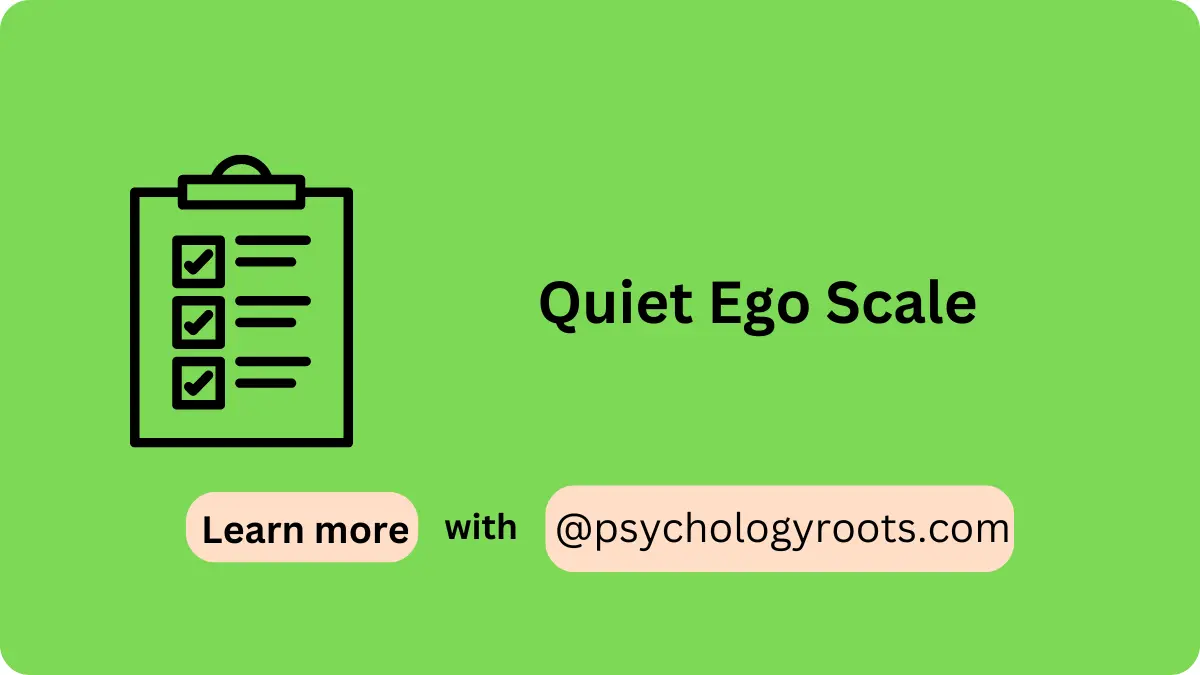Table of Contents
Quiet Ego Scale
Here in this post, we are sharing the “Quiet Ego Scale”. You can read psychometric and Author information. We have thousands of Scales and questionnaires in our collection (See Scales and Questionnaires). You can demand us any scale and questionnaires related to psychology through our community, and we will provide you with a short time. Keep visiting Psychology Roots.
About Quiet Ego Scale
Scale Name
Quiet Ego Scale
Author Details
Heidi A. Wayment (Heidi.Wayment@nau.edu), Jack J. Bauer and Kateryna Sylaska
Translation Availability
Not Sure

Background/Description
The Quiet Ego Scale was developed to measure a balanced, compassionate sense of self, often referred to as the “quiet ego.” This concept emphasizes a self-identity that is not overly focused on self-aggrandizement or egoistic pursuits but rather integrates concern for oneself with care and compassion for others. The quiet ego is not about selflessness but about a self that is aware of both personal needs and the needs of others, allowing for personal growth while maintaining meaningful social connections.
The Quiet Ego Scale assesses traits related to mindfulness, growth, compassion, and lower defensiveness, contributing to overall psychological well-being. The scale provides insights into how individuals manage their self-concept, focusing less on inflating the ego and more on fostering a balanced, integrated self-awareness. This aligns with psychological models of eudaimonic well-being, emphasizing the importance of meaning, connection, and personal growth rather than mere self-enhancement.
Administration, Scoring and Interpretation
- Target Population: The scale can be administered to adolescents and adults to evaluate aspects of ego functioning related to compassion, mindfulness, and personal growth.
- Format: The Quiet Ego Scale consists of 14 items that participants respond to on a 5-point Likert scale, ranging from strongly disagree to strongly agree. The items reflect key aspects of the quiet ego, including personal growth, balanced ego, compassion, and mindfulness.
- Administration: The scale can be self-administered or used in research settings to explore personality traits and self-concept.
- Scoring: Each item is scored between 1 and 5, with higher scores indicating a greater orientation toward the quiet ego. The total score is calculated by averaging the responses across all items.
- Interpretation: Higher scores suggest a quiet ego, characterized by a healthy balance between self-interest and concern for others, as well as enhanced self-awareness, compassion, and lower defensiveness. Lower scores may indicate a more ego-centric self-concept, where self-aggrandizement and defensiveness might dominate.
Reliability and Validity
The Quiet Ego Scale has demonstrated strong psychometric properties in various studies. The scale exhibits high internal consistency (Cronbach’s alpha above 0.80), making it a reliable measure for assessing quiet ego traits. Additionally, the scale has shown strong construct validity, as it correlates with related measures of mindfulness, self-compassion, and eudaimonic well-being.
- Reliability: The scale has been found to be consistent across different samples, with good internal reliability.
- Validity: Studies have supported the validity of the Quiet Ego Scale in measuring a compassionate self-identity and its association with well-being, lower levels of defensiveness, and greater personal growth.
Available Versions
14-Items
Reference
Wayment, H. A., Bauer, J. J., & Sylaska, K. (2015). The quiet ego scale: Measuring the compassionate self-identity. Journal of Happiness Studies, 16, 999-1033.
Important Link
Scale File:
Frequently Asked Questions
Q: What does the Quiet Ego Scale measure?
A: The Quiet Ego Scale measures traits related to a balanced sense of self that integrates personal well-being with concern for others, reflecting a compassionate and mindful self-identity.
Q: Who can take the Quiet Ego Scale?
A: The scale is designed for adolescents and adults, making it suitable for individuals or groups in both clinical and research settings.
Q: How is the Quiet Ego different from low self-esteem?
A: Unlike low self-esteem, which involves a negative self-view, the quiet ego reflects a positive, balanced self-identity that emphasizes mindfulness, compassion, and growth without excessive focus on self-importance.
Q: Is the Quiet Ego Scale useful for personal development?
A: Yes, the scale provides insights into how individuals balance self-care and concern for others, making it a useful tool for self-reflection and personal growth.
Q: How reliable is the Quiet Ego Scale?
A: The scale has demonstrated high internal consistency and reliability, making it a robust measure for evaluating ego traits related to compassion and mindfulness.
Disclaimer
Please note that Psychology Roots does not have the right to grant permission for the use of any psychological scales or assessments listed on its website. To use any scale or assessment, you must obtain permission directly from the author or translator of the tool. Psychology Roots provides information about various tools and their administration procedures, but it is your responsibility to obtain proper permissions before using any scale or assessment. If you need further information about an author’s contact details, please submit a query to the Psychology Roots team.
Help Us Improve This Article
Have you discovered an inaccuracy? We put out great effort to give accurate and scientifically trustworthy information to our readers. Please notify us if you discover any typographical or grammatical errors.
Make a comment. We acknowledge and appreciate your efforts.
Share With Us
If you have any scale or any material related to psychology kindly share it with us at psychologyroots@gmail.com. We help others on behalf of you.